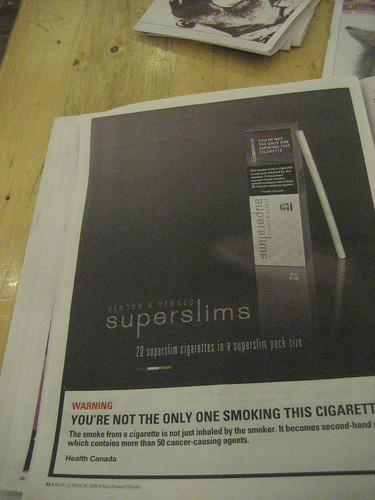 |
| Flickr: Phil Wiffen |
In contrast to smoking, social sharing done right actually helps rather than hurts. In fact, the rise of online social networking and social multimedia sharing has been downright amazing technological development. Moved by this awe, last year in a project proposal, I effused that social networks are, "...a virtual prosthetic that extends the strong fabric of social connectivity critical to the well-being and growth of human societies into the online realm."
That proposal developed the idea of "worry-free social sharing": a social sharing client that would gently alert us when our sharing actions, in ways we do not intend, threaten to compromise our privacy---and then suggest alternative actions, which allow us to share our personal experiences, but in a wiser way.
Yes, people are responsible for their own actions. But in some cases, we as individual users do not have the understanding of multimedia analysis technology, or of the power of algorithms to combine different sorts of data to reveal facts about us that we thought were hidden. We all would need such understanding in order to allow us to make informed decisions about which types of social sharing is harmless and which types should better be avoided.
Even for the most savvy of us there are always surprises: Did you know that if you upload a video to YouTube and you carefully avoid geo-tagging it, but if you happen to be in a city and capture an ambulance siren in the background, that siren will serve to indicate in which city you are? Check out the work on multimodal location estimation [1]. Maybe you don't care if the world knows where you are, but if you do happen to be worried about having left your house empty during your vacation, it would be good to know that you just about betrayed your location to the world without realizing it. I've written about this before, e.g., in this post that mentions cybercasing.
It is within the reach of technology to build a "worry-free social sharing" client. The problem is getting the research funding to do so. Industry doesn't really have an interest in having users start being concerned about the implications of their sharing behavior. (It's in their interest to just send the message "share more".) Sure, it's unpleasant and possibly off-putting to have to reflect on the fact that someone might break into your house based on information about your location gleaned from videos that you post to YouTube. But is seems to me that "worry-free sharing" is an idea that users could identify with: just like the cereal box in the morning that announces how much fiber and how many vitamins we are consuming promotes consumption rather than driving people away from a product.
Another project proposal won the competition over the "worry-free social sharing" idea. One of the professors involved in the review later informed me that "worry-free social sharing" sounded like something female. I wasn't really sure what to do with that remark beyond thinking that it probably wasn't one of the considerations for the decision and storing it away for future reference.
I hadn't thought about the femaleness of privacy protection until this weekend, during the new Batman Movie. Here, we watched Cat Woman chasing something called "Clean Slate". She knows that what she needs in order to live her life the way she wants it is to make a clean break with the past. But Batman eventually recognizes this too. And I am happy to see other voices online interested in the privacy themes of the Batman movie. So I am not going to assume that there is only one half of the world population that would be interested in "worry free" sharing solutions.
Thinking about Batman also brought me back to the parallel with the cigarette warning label case. The label pictured above warns of the dangers of second hand smoke, "You're not the only one smoking this cigarette." If warning people about the dangers for their near and dear ones motivates people to cut back or stop smoking, maybe the same effect is true of social sharing. The "worry-free social sharing" client can remind us: Hey, you don't mind posting this picture, but maybe it will have unintended consequences for your friend, who is also pictured.
If you don't believe me, believe Batman: "You wear the mask to protect those you love."
Gerald Friedland, Oriol Vinyals, and Trevor Darrell. Multimodal location estimation. In Proceedings of the international conference on Multimedia (MM '10). ACM, New York, NY, USA, 1245-1252.